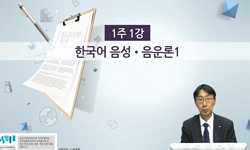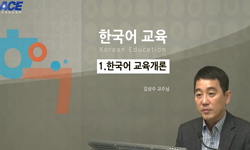This study aims to project Korean culture education, focused on learner, where learner becomes the active principal and forms the Korean culture knowledge. Currently the culture education in Korean language education is usually made in a way to presen...
http://chineseinput.net/에서 pinyin(병음)방식으로 중국어를 변환할 수 있습니다.
변환된 중국어를 복사하여 사용하시면 됩니다.
- 中文 을 입력하시려면 zhongwen을 입력하시고 space를누르시면됩니다.
- 北京 을 입력하시려면 beijing을 입력하시고 space를 누르시면 됩니다.
한국 현대시를 활용한 상호문화 지식 교육에 대한 고찰 - 중국인 학습자의 문화 지식 구성 양상을 중심으로 - = A Study on Intercultural Knowledge Education Using Korean Modern Poetry
한글로보기https://www.riss.kr/link?id=A107321273
- 저자
- 발행기관
- 학술지명
- 권호사항
-
발행연도
2021
-
작성언어
-
- 주제어
-
자료형태
학술저널
-
수록면
277-317(41쪽)
- 제공처
-
0
상세조회 -
0
다운로드
부가정보
다국어 초록 (Multilingual Abstract)
This study aims to project Korean culture education, focused on learner, where learner becomes the active principal and forms the Korean culture knowledge. Currently the culture education in Korean language education is usually made in a way to present fragmentary knowledge. However, as culture is a learning object to recognize, feel and experience, it is better for the teacher not to make the culture education via one-way provision of cultural knowledge. In this context, this study used the concept of ‘inter-culture’ and projected a intercultural knowledge education where the learner interacts with the target culture, based on his/her cultural identity, to understand, interpret, and personalize the cultural knowledge. In addition, considering the possibility that the cultural knowledge construction may differ by language level, this study tried to find out the difference in the cultural knowledge construction by intermediate and advanced level learners and design different teaching and learning method based on the difference.
In this study, ‘knowledge’ is assumed not just as the knowledge as a target but as the more expanded concept to comprise the process of knowledge construction and affective aspects. Also, in this study, Korean modern poems are used as education materials to have affective approaches to Korean culture. As the principles of intercultural knowledge construction using Korean modern poems, ‘formation of Kommunikat via understanding of the text’, ‘construction of the meaning of culturalknowledge via interactions’, and ‘reconstruction of cultural knowledge as personal knowledge’ are proposed. And, this study found that the intercultural knowledge education using Korean modern poetry has educational implication as it provides personal experience of poetic emotion via which the learner can have affective approaches to Korean culture, personalize via active meaning construction of the poem’s text, and foster intercultural competence via inter-culture communication.
The experiment of this study was administered for Chinese intermediate and advanced level learners and designed to achieve both personal knowledge construction and inter-personal knowledge construction based on the viewpoint of constructivism. In addition, to compare the aspects of knowledge construction that differ by the level of language of each learner, the experiment was administered by two different groups of intermediate and advanced level learners.
The study observed following categories in the cultural knowledge construction aspects using the Korean modern poems. Firstly, in the aspect of ‘forming Kommunikat via understanding of the text’, learners used either the internal information of the text or external factors of the text. Secondly, in the aspect of ‘construction of cultural knowledge meaning via interactions’, learners either understood the factual meaning of the text or shared the awareness on self-culture and personal cultural awareness. Thirdly, in the aspect of ‘reconstruction of cultural knowledge as personal knowledge’, learners stated cultural knowledge based on the understanding of the text and interpreted the cultural knowledge via making relations between cultures and personalized the cultural knowledge via personal reactions.
The difference in the aspect of intercultural knowledge construction by intermediate and advanced level learners was as follows: Most advanced level learners understood the cultural knowledge via the poem’s text to proceed to interpretation and personalization. Compared to this, intermediate level learners failed to make active interpretation of the cultural knowledge and personalization as they stayedin the stage of understanding the text. That is, in many cases, intermediate level learners aroused the knowledge of self-culture in the stage of interpretation, however, due to the lack of understanding on the text, they failed to make active comparison between the cultures and kept the awareness of self-culture in the stage of personalization, which made them keep the awareness of the self-culture to keep the affective distance with other culture and failed to make reflective recognition on the self-culture.
The study is meaningful as it found the processes and various aspects of cultural knowledge construction by using Korean modern poems based on actual data of learners’ noticing the importance of the processes of cultural knowledge construction, and, it projected differences in the aspects of cultural knowledge construction between intermediate and advanced level Chinese learners.
동일학술지(권/호) 다른 논문
-
학습자의 귀추적 추론 양상 분석을 통한 국어사 탐구 교육 연구
- 서울대학교 국어교육과
- 강지영 ( Kang Jiyoung )
- 2021
-
- 서울대학교 국어교육과
- 김민지 ( Minji¸ Kim )
- 2021
-
표현 효과 중심의 문법교육적 관점에 입각한 학습자의 부정표현 선택 과정 유형 분석 연구
- 서울대학교 국어교육과
- 김범진 ( Kim¸ Beom-jin )
- 2021
-
인도네시아인 한국어 학습자 쓰기 교육의 응결장치 교수학습 연구
- 서울대학교 국어교육과
- 김선주 ( Kim Sun Joo )
- 2021




 KISS
KISS






